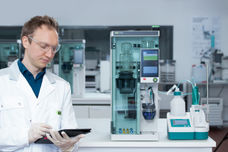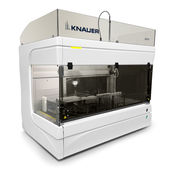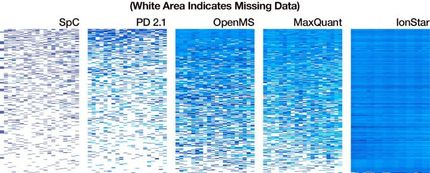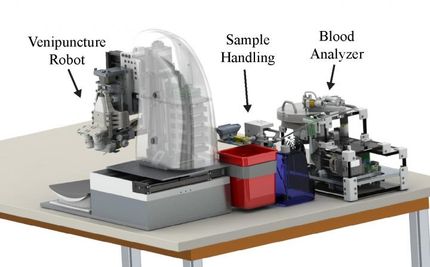Detecting hundreds of proteins in a single sample
Barcoding technique offers cost-effective alternative to current technology
New technology developed by a team of McGill University scientists shows potential to streamline the analysis of proteins, offering a quick, high volume and cost-effective tool to hospitals and research labs alike.
Proteins found in blood provide scientists and clinicians with key information on our health. These biological markers can determine if a chest pain is caused by a cardiac event or if a patient has cancer.
Unfortunately, the tools used to detect such proteins haven't evolved much over the past 50 years - despite there being over 20,000 proteins in our body, the vast majority of protein tests run today target only a single protein at-a-time.
Now, PhD candidate Milad Dagher, Professor David Juncker and colleagues in McGill's Department of Biomedical Engineering have devised a technique that can detect hundreds of proteins with a single blood sample.
Part of their work describes a new and improved way to barcode micro-beads using multicolour fluorescent dyes. By generating upwards of 500 differently coloured micro-beads, their new barcoding platform enables detection of markers in parallel from the same solution--for example, a blue barcode can be used to detect marker 1, while a red barcode can detect marker 2, and so on. A laser-based instrument called a cytometer then counts the proteins that stick to the different coloured beads.
Though this kind of analysis method has been available for some time, interference among multicolour dyes has limited the ability to generate the right colours. Now, a new algorithm developed by the team enables different colours of micro-beads to be generated with high accuracy--much like a colour wheel can be used to predict the outcome of colour mixing.
Professor Juncker's team is hoping to leverage its platform for improved analysis of proteins.
"Current technologies hold a major trade-off between the number of proteins that can be measured at once, and the cost and accuracy of a test", Dagher explains. "This means that large-scale studies, such as clinical trials, are underpowered because they tend to fall back on tried-and-true platforms with limited capabilities."
Their upcoming work focuses on maintaining accurate detection of proteins with increased scale.
Original publication
Other news from the department science
These products might interest you

Kjel- / Dist Line by Büchi
Kjel- and Dist Line - steam distillation and Kjeldahl applications
Maximum accuracy and performance for your steam distillation and Kjeldahl applications

AZURA Purifier + LH 2.1 by KNAUER
Preparative Liquid Chromatography - New platform for more throughput
Save time and improve reproducibility during purification

Get the analytics and lab tech industry in your inbox
By submitting this form you agree that LUMITOS AG will send you the newsletter(s) selected above by email. Your data will not be passed on to third parties. Your data will be stored and processed in accordance with our data protection regulations. LUMITOS may contact you by email for the purpose of advertising or market and opinion surveys. You can revoke your consent at any time without giving reasons to LUMITOS AG, Ernst-Augustin-Str. 2, 12489 Berlin, Germany or by e-mail at revoke@lumitos.com with effect for the future. In addition, each email contains a link to unsubscribe from the corresponding newsletter.
























































